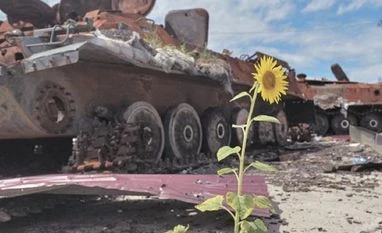A report titled "United West, divided from the rest: Global public opinion one year into Russia’s war on Ukraine" has highlighted how people across continents view the Russia-Ukraine war, its outcomes, and a possible solution.
The report is based on a new multi-country global poll to track what the public thinks about the ongoing conflict.
According to the report, a majority of Indians view both the US and Russia as allies and think that the Russia-Ukraine war should end as soon as possible even if it means that Ukraine has to give up on territory.
"Respondents to the poll in India stand out in describing both the US (47 per cent) and Russia (51 per cent) as an 'ally' – which is likely partly because, for them, China is either an 'adversary' (39 per cent) or a 'rival' (37 per cent). Perceptions of the European Union and Great Britain are also predominantly positive: Indians see these as either an “ally” or “partner”, the report said.
The poll suggests that a majority of the Indian public perceives almost every other power – including the US (70 per cent), Russia (63 per cent), China (53 per cent), the EU (67 per cent), Great Britain (63 per cent), and India itself (68 per cent) – as “stronger” than they say they thought before Russia’s all-out war on Ukraine.
Indians are the only ones to hold such a view of all of the US, Russia, the EU, Great Britain, and their own country, according to the report.
The report also highlights that Indians appear to feel positive about the future. Their main responses when asked to describe their country are that it is 'rising' (35 per cent), 'strong' (28 per cent), and 'peaceful' (18 per cent).
Only a small proportion believe it is 'declining' (8 per cent) or 'weak' (7 per cent). By way of comparison, 31 per cent of Americans and Britons characterise their own country as 'declining'.
India is also the only CITRUS country, where the prevailing opinion is that the US (28 per cent) and Europe (36 per cent) are mostly supporting Ukraine to defend it as a democracy, according to the report.
The poll suggests that while the ongoing war has united the west as European and American citizens hold many views in common on global questions, citizens from non-western countries like China and India hold starkly different opinions.
"...a year since Russia’s war on Ukraine began, the US and its European allies have regained their unity and sense of purpose. But the study also reveals a wide gap between the West and the ‘rest’ when it comes to their desired outcomes for the war and differing understandings of why the US and Europe support Ukraine."
While the Europeans and Americans agree they should help Ukraine to win the war and see Russia as their avowed adversary, citizens in China, India, and Turkey prefer a quick end to the war even if Ukraine has to concede territory.
"Russia is either an “ally” or a “partner” for 79 per cent of people in China and 69 per cent in Turkey. Moreover, around three-quarters in each of these two countries and in India believe that Russia is either stronger, or at least equally strong, compared to how they say they perceived it before the war."
The report suggests that western citizens believe that the coming global order will most likely be defined by two blocs led by the US and China respectively.
In contrast, citizens in non-western countries foresee emergence of a multipolar world order as against a bipolar one.
The poll highlights that around 54 per cent of Indians agreed that the conflict between Russia and Ukraine needs to stop as soon as possible, even if it means Ukraine giving control of areas of its territory to Russia. Whereas, in the west, the new consensus among European governments is that only a Ukrainian victory will stop "Putin's war".
"In China, a plurality of those asked (42 per cent) agree that the conflict between Russia and Ukraine needs to stop as soon as possible, even if it means Ukraine giving control of areas of its territory to Russia. This desire to end the war soon is even stronger in Turkiye (48 per cent) and India (54 per cent)."
The poll was conducted in December 2022 and January 2023 in nine EU countries and Great Britain, and in China, India, Turkey, Russia, and the US (the CITRUS countries, to use the shorthand of the University of Oxford’s Europe in a Changing World project).
Its results suggest that Russia’s aggression in Ukraine marks both the consolidation of the West and the emergence of the long-heralded post-Western international order.

Unlock 30+ premium stories daily hand-picked by our editors, across devices on browser and app.
Pick your favourite companies, get a daily email with all news updates on them.
Full access to our intuitive epaper - clip, save, share articles from any device; newspaper archives from 2006.
Preferential invites to Business Standard events.
Curated newsletters on markets, personal finance, policy & politics, start-ups, technology, and more.



)